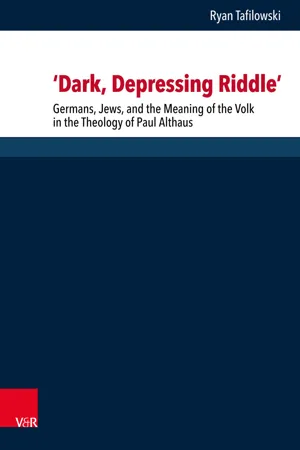
'Dark, Depressing Riddle'
Germans, Jews, and the Meaning of the Volk in the Theology of Paul Althaus
- 256 pages
- English
- PDF
- Available on iOS & Android
'Dark, Depressing Riddle'
Germans, Jews, and the Meaning of the Volk in the Theology of Paul Althaus
About This Book
At the twilight of the Weimar Republic, politicians, scientists, and theologians were engaged in debates surrounding the so-called "Jewish Question." When the Nazi Party came to power in 1933, these discussions took on a new sense of urgency and poignancy. As state measures against Jews unfolded, theological conceptions of the meaning of "Israel" and "Judaism" began to impact living, breathing Jewish persons.In this study, Ryan Tafilowski traces the thought of the Lutheran theologian Paul Althaus (1888–1966), who once greeted the rise of Hitler as a "gift and miracle of God, " as he negotiated the "Jewish Question" and its meaning for his understanding of Germanness across the Weimar Republic, the Nazi years, and the post-war period. In particular, the study uncovers the paradoxical categories Althaus used to interpret the ongoing theological significance of the Jewish people, whom he considered both an imminent threat to German ethnic identity and yet a mysterious cipher by which Germans might decode their own spiritual destiny in world history.Sketching the peculiar contours of Althaus' theology of Israel, this study offers a fresh interpretation of the Erlangen Opinion on the Aryan Paragraph, which is an important artifact not only of the Kirchenkampf, but also of the complex and ambivalent history of Christian antisemitism. By bringing Althaus into conversation with some of the most influential theologians of the twentieth century—from Karl Barth and Emil Brunner to Rudolf Bultmann and Dietrich Bonhoeffer—Tafilowski broadens the scope of his inquiry to vital questions of political theology, ethnic identity, social ethics, and ecclesiology. As Christian theologians must once again reckon with questions of national self-understanding under the pressures of mass migration and resurgent nationalisms, this investigation into the logic of ethno-nationalist theologies is a timely contribution.
Frequently asked questions
Information
Table of contents
- Title Page
- Copyright
- Table of Contents
- Body
- Chapter I | Introduction
- Movement I: The Volk who belong everywhere and nowhere: Althaus' societal vision for the Jews during the Weimar Republic (1919–1933)
- Chapter II | Invisible others: the “Jewish Question” in the Althausian imagination
- Chapter III | “Open wounds”: the mysterious purpose of Jewish existence
- Movement II: At the church's “German hour”: Germans, Jews, and ecclesial space under National Socialism (1933–1945)
- Chapter IV | Volk before church: the Erlangen Opinion on the Aryan Paragraph and the Ansbach Memorandum
- Chapter V | Inclusive quarantine in microcosm: Jewish pathology and performance in the German churches
- Movement III: The death throes of Judaism: reflection on the “Jewish Question” in the postwar years (1945–1966)
- Chapter VI | Catastrophe and conscience: Jews and Germans as fellow travelers
- Chapter VII | The collapse of the dialectic: dogmatic and exegetical works
- Movement IV: Althaus and the challenge of (pseudo-)Lutheran ethics
- Chapter VIII | self-defeating tendencies in the Althausian theology of Volk
- Chapter IX | The makings of a Lutheran corrective: Bonhoeffer, Bultmann, and Sasse
- Chapter X | Conclusion
- Appendix I | Theologisches Gutachten über die Zulassung von Christen jüdischer Herkunft zu den Ämtern der Deutschen Evangelischen Kirche (Erlanger Gutachten)
- Appendix II | Der “Ansbacher Ratschlag” zu der Barmer “Theologischen Erklärung”
- Bibliography
- Index